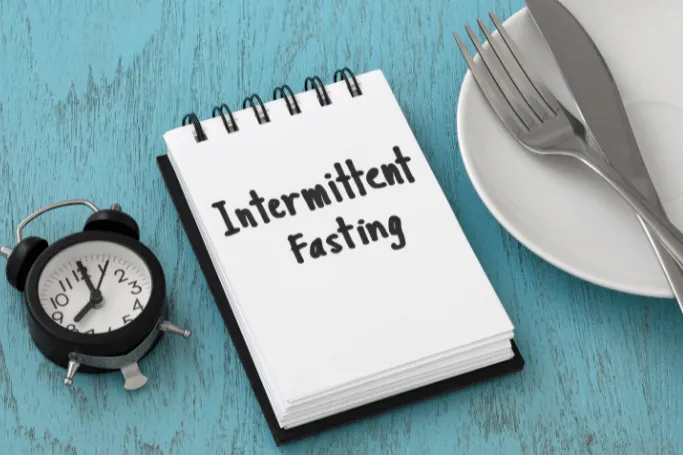Getting Started with Intermittent Fasting

You've probably heard about intermittent fasting by now (IF). The last time you all got together, brunch may have been skipped by your brother because it was too early for him to eat. Or perhaps the last time you saw your pal, she was unable to attend a late dinner.
Even though intermittent fasting (IF) has just entered the lexicon of common diets, fasting itself is nothing new. According to legend, fasting was invented by Hippocrates in the fifth century B.C. various religious traditions, particularly Islam, depend on it heavily to treat illness.
You might try IF or fasting for a variety of reasons, from weight loss to wellness. Get the skinny about IF specifically by using this scientific manual. If you decide to start, you can also receive advice on how to position yourself for success.
Intermittent fasting: What Is It?
Intermittent fasting has fewer restrictions than some other diets. According to Heather Bauer, RDN, owner of Heather Bauer Nutrition in New York City, the strategy is focused on "totally or partially limiting or refraining from eating within a certain period of time."
In other words, IF calls for meal breaks. Although some people enjoy IF, she advises that not everyone should follow this diet.
The Workings of Intermittent Fasting
By determining which days of the week you will fast, you can customize your IF to fit your preferences. You'll probably adhere to a severely calorie-restricted diet or go entirely without food on fasting days. You can also fast every day for a specific period of time. This ultimately leads to consuming fewer calories throughout the course of the week, and according to some professionals, such as Caroline Susie, RDN, a Dallas representative for the Academy of Nutrition and Dietetics, this calorie reduction is what occasionally causes weight loss and may then result in additional metabolic benefits.
Common Issues & Solutions
Is sporadic fasting secure?
In general, yes. However, you shouldn't attempt this diet if you are expecting or nursing, have a BMI that is deemed underweight, or have a history of an eating disorder. Additionally, avoid attempting intermittent fasting if you are above 70. Ask your doctor if this is safe for you if you have diabetes or are taking drugs that have a time limit.
Types of Intermittent Fasting
There is no set method for performing IF. According to Krista Varady, PhD, a professor of nutrition at the University of Illinois in Chicago and an expert on intermittent fasting, "intermittent fasting is an umbrella term for three different types of diets." She claims this is what you're most likely to see:
Day-by-Day Fasting
You eat 500 calories every other day while on the alternate-day fasting method that is most popular. You can eat whatever you want on days off.
5:2 Diet
You eat 500 calories twice a week on separate days, a practice that is common in the UK. You can eat whatever you want on the other days.
Time-Restricted Consumption
You select a time frame during which you may eat (feast); the remainder of the day, you refrain from eating (fast). One common arrangement is 16:8, which calls for a 16-hour fast followed by eight hours of eating. For instance, you might choose to eat between midday and eight o'clock. daily. This is sometimes referred to as skipping breakfast.
Benefits of Intermittent Fasting for Health
Overall, there hasn't been much thorough, extensive research on intermittent fasting, and many of the results you'll find online are based on animal studies, according to Susie. Any form of IF's long-term effectiveness and safety are debatable.
Here are some ways that IF might help you in light of that:
Prevention of Heart Disease
One review found that IF is promising for enhancing cardiovascular health because it lowers cardiovascular risk factors like obesity, high blood pressure and cholesterol, and diabetes, though more research is required. At the moment, researchers are unsure of which type of IF is best for heart health.
Diabetes Type 2 treatment
Fasting promotes weight loss, lowers insulin resistance, and has positive effects on hormones generated by fat cells that control hunger and inflammation levels. It may be a viable treatment for type 2 diabetes. Having said that, you should consult your doctor before starting IF if you have diabetes.
Avoid Stroke and Alzheimer's Disease
Although more research is needed, some studies have found that IF may help lower the chance of stroke and Alzheimer's disease. However, a lot of this knowledge comes from studies on animals, and it's unclear when someone should begin IF in order to lower their risk of neurological disorders. Furthermore, contrary to claims made by supporters that IF enhances cognitive skills like focus, IF does not seem to be a temporary brain booster.
Enhance Nonalcoholic Liver Disease
Adults with nonalcoholic fatty liver disease (liver disease seen in people with obesity, diabetes, and metabolic syndrome) who practiced intermittent fasting (IF) saw an improvement in liver function tests, compared to people who didn't fast, in a systematic review and meta-analysis of six trials. However, the researchers point out that additional extensive, randomized studies are required before providing specific recommendations. The authors concluded that this was because IF causes weight loss.
Effects of Intermittent Fasting on Weight Loss
Simply put, when you follow IF, you eat less frequently—either for fewer hours in the day or for fewer days. According to Dr. Varady's studies, time-restricted eating naturally burns off several hundred calories each day. She has found in her research that this typically leads in dropping one to two pounds per week. It is comparable to following a calorie-restricted diet every day, with the advantage that you are not required to track your calories.
In one of her research, it was discovered that subjects who limited their eating window to eight hours daily ingested around 300 less calories and dropped 3 percent of body weight over a 12-week period. Alternate-day fasting, on the other hand, can help someone reduce their daily calorie intake by 25 to 35 percent (over the course of a week) and results in weight loss of 4 to 6 percent of body weight over a 12-week period.
"With alternate-day fasting, the weight comes off twice as fast," says Varady, who conducted the review of 11 meta-analyses. "IF, particularly alternate-day fasting, is beneficial for helping overweight or obese adults decrease their body mass index (BMI), a measure of body weight, better than a regular diet. She claims that many people find alternate-day fasting more challenging to maintain and integrate into daily life than time-restricted eating. Varady's study found that 30 to 40% of participants withdrew from alternate-day fasting tests. Varady's research shows that time-restricted eating has a dropout rate of only 5%.
In spite of this, more long-term statistics (based on monitoring people for a year to two) are required. The average length of Varady's published research is six months.
Editors' Choices
According to Registered Dietitians, Here Are the Best and Worst Diets for Long-Term Weight Loss
According to Registered Dietitians, Here Are the Best and Worst Diets for Long-Term Weight Loss
Should you attempt the keto diet, a strict or flexible vegetarian diet, or some other strategy? Although not everyone should diet, there are some that are easier to follow and also healthier than others if you do want to give it a shot.
Effects of intermittent fasting
Be cautious of potential negative effects before beginning a completely new food regimen, advises Susie:
Headaches
Fatigue
low vigor
Irritability
Hunger
Susie explains that any of these could occur if you aren't eating. Although they are common, they are uncomfortable and can have an impact on your daily sense of wellbeing. Some persons may decide to cease IF if they discover that there are poor trade-offs. This is perfectly OK. Not everyone will enjoy it.
One thing to keep in mind, according to Varady, is that your body will adjust to a new eating pattern and your appetite will subside after the first 10 days.
Intermittent fasting health risks
If you are expecting or nursing, Bauer advises against trying intermittent fasting. Similarly, IF is not recommended if you have a low BMI (underweight) or a history of eating disorders. Varady also advises those over the age of 70 not to try fasting because it can result in muscle loss, which is important to prevent as we age.
Additionally, if you have diabetes of any kind, consult your doctor beforehand as this could not be safe for you. You should also speak with your doctor if you are taking any medications that must be taken at a specific time and with food in order to be effective. Skipping meals can result in low blood sugar, which can cause fainting, dizziness, and falls.
Related posts



